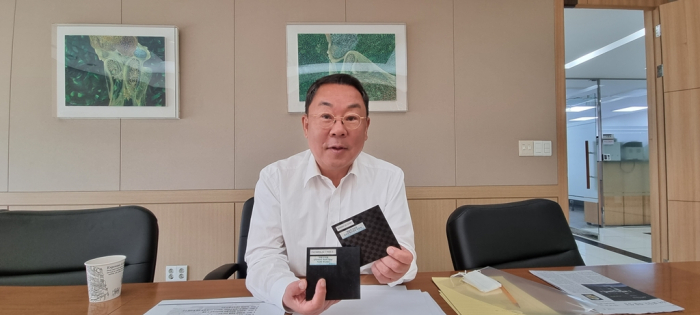Korean SMEs
Korea composite materials maker to expand aerospace biz
Hankuk Carbon buys Slovak automotive and aerospace parts maker c2i to develop materials for aircraft wings, drones and satellites
By Jun 02, 2022 (Gmt+09:00)
2
Min read
Most Read
LG Chem to sell water filter business to Glenwood PE for $692 million


Kyobo Life poised to buy Japan’s SBI Group-owned savings bank


KT&G eyes overseas M&A after rejecting activist fund's offer


StockX in merger talks with Naver’s online reseller Kream


Mirae Asset to be named Korea Post’s core real estate fund operator



South Korea’s top advanced composite materials producer aims to speed up its expansion in the aerospace sector with the acquisition of an airplane parts maker in Europe.
Hankuk Carbon Co. bought a 100% stake in c2i, a Slovak composite components producer for automotive and aerospace sectors, from South Korea’s LX Hausys Ltd., a building materials affiliate of LX Group, last month.
“The c2i deal is aimed at accelerating the expansion in the aerospace business,” Hankuk Carbon CEO and Chairman Cho Moon-soo told The Korea Economic Daily in an interview on May 31. “We will develop special materials for aircraft wings, drones and satellites to increase the global supply chain.”
Hankuk Carbon dominates the South Korean market, producing about 210,000 square kilometers of carbon fiber-reinforced plastic (CFRP) and glass fiber-reinforced plastic (GFRP). CFRP, a composite material produced by combining carbon fiber woven with thread in which carbon molecules are connected with synthetic resin, is ten times stronger than steel but up to five times lighter.
STARTS SPACE BUSINESS
The Kospi-listed company has been working on composite materials for aircraft since 2014. It founded Korea Aviation Technologies (KAT), a joint venture with Israel Aerospace Industries, in 2018 to develop and manufacture unmanned aerial vehicles (UAVs) with vertical takeoff and landing (VTOL) capability that will target the military and civilian market. IAI is owned by Israel’s government.
Hankuk Carbon in August last year signed a 29 billion won ($23 million) deal to supply US Gulfstream Aerospace Corp. with the tail wing structure for the Gulfstream G280, a midsize jet.
“The acquisition of c2i, an aircraft interior components and automobile lightweight parts maker, is expected to help accelerate the entry to the European market,” Cho said.
Hankuk Carbon made inroads into the space business with the development of a material that is twelve times thinner than the existing CFRP and reduces product weights by more than 20%.
“We are carrying out various tests with KAI to use it for the body of Korea’s next-generation midsize satellite,” Cho said, referring to Korea Aerospace Industries Ltd.
KOREA’S BIG THREE SHIPBUILDERS ARE CUSTOMERS
Hankuk Carbon’s core products are insulation materials for liquefied natural gas (LNG) and liquefied hydrogen carriers. They are manufactured by overlapping various materials such as nickel steel, stainless steel and polyurethane on CFRP or GFRP. The materials enable customers to store liquefied hydrogen at as low temperatures as minus 253 degrees.
With the materials, Hankuk Carbon secured the country’s Big Three shipbuilders - Hyundai Heavy Industries Co., Daewoo Shipbuilding & Marine Engineering Co. and Samsung Heavy Industries Co. – as its key customers.
Hankuk Carbon is expected to improve earnings on the growing demand for LNG and liquefied hydrogen tankers, as well as the expansion in the new business, analysts said.
The company was expected to report 40.6 billion won in operating profit with sales of 433.7 billion won next year, up more than 80% and 30% from forecasts for 2022, according to Hana Financial Investment Co.
Write to Jin-Won Kim at jin1@hankyung.com
Jongwoo Cheon edited this article.
More to Read
-
 Business & PoliticsTrump Jr. meets Korean business chiefs in back-to-back sessions
Business & PoliticsTrump Jr. meets Korean business chiefs in back-to-back sessionsApr 30, 2025 (Gmt+09:00)
-
 Korean chipmakersSamsung in talks to supply customized HBM4 to Nvidia, Broadcom, Google
Korean chipmakersSamsung in talks to supply customized HBM4 to Nvidia, Broadcom, GoogleApr 30, 2025 (Gmt+09:00)
-
 EnergyLS Cable breaks ground on $681 mn underwater cable plant in Chesapeake
EnergyLS Cable breaks ground on $681 mn underwater cable plant in ChesapeakeApr 29, 2025 (Gmt+09:00)
-
 Business & PoliticsUS tariffs add risk premium to dollar assets: Maurice Obstfeld
Business & PoliticsUS tariffs add risk premium to dollar assets: Maurice ObstfeldApr 29, 2025 (Gmt+09:00)
-

Comment 0
LOG IN


